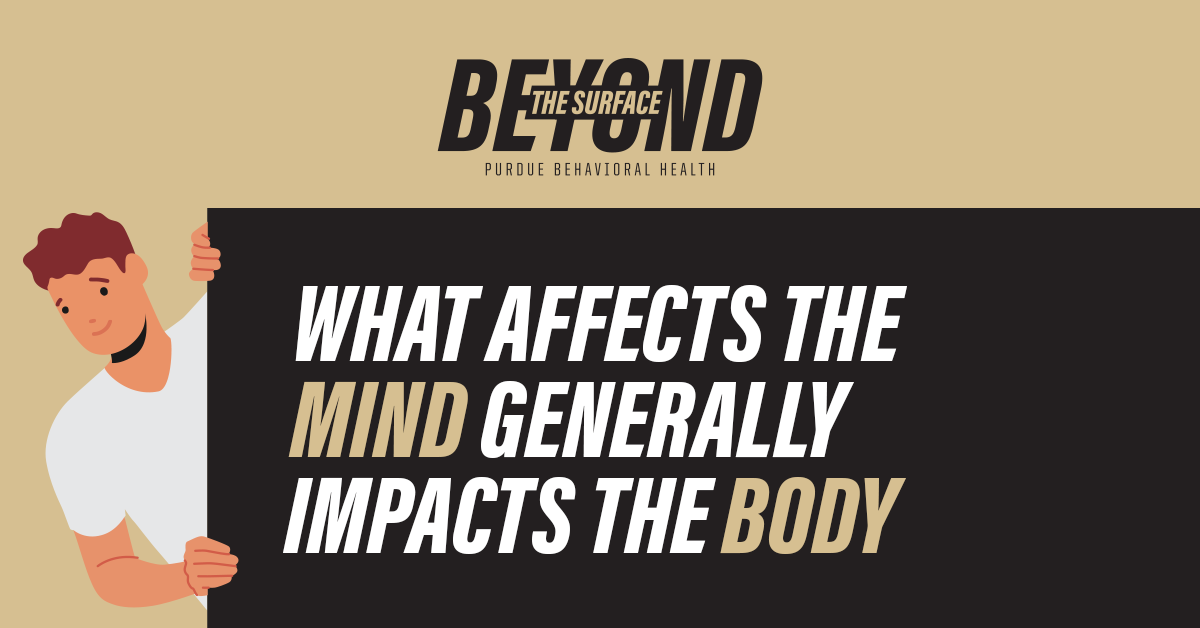September 28, 2022
10 ways to care for your physical and behavioral health

This article is part of Human Resources’ series for Beyond the Surface, a call to action to normalize mental health struggles and prioritize mental wellness in all of our lives.
What affects the mind impacts the body — and vice versa. Although people may think of the mind and body as separate, behavioral and physical health are actually interconnected. Even if someone can’t see behavioral health struggles, the body is likely experiencing signs. Likewise, if someone has chronic or significant physical health issues, it can take a toll on their mental health. To improve overall health and well-being, people should take care of both their physical and behavioral health.
Here are 10 ways to take care of physical and behavioral health:
- Get regular exercise: Not only does it keep you physically fit, but it can also improve your mood.
- Eat a balanced diet: A diet high in fruits and vegetables and low in processed sugars and fats can make people feel better physically and mentally.
- Get enough sleep: A good night’s rest is everything — and most adults need seven to nine hours to feel truly rested.
- Try relaxation techniques: Meditation, deep breathing and mindfulness all help calm the nervous system. (Tip: The Healthy Boiler Portal offers meditation courses under the University tab.)
- Connect with others: Social connections make people feel good mentally. Bonus: They can also lower anxiety and depression, regulate emotions and improve the immune system.
- Give the benefit of the doubt: Most people are doing the best they can. When people extend grace or assume the best, it will positively impact how they respond.
- Help others: Volunteering in the community benefits you as much as the organization to which you’re donating your time and talent.
- Avoid negative outlets: Alcohol or drugs can add to stress. Some people are also triggered by social media.
- Take a break: Find an activity such as reading, watching a movie, exercising, etc. that allows time to not have to think about the stressors in life.
- Seek professional help: Talking with a trained counselor can help with processing emotions, learning how to respond and developing coping strategies.
Need help? Tap into these resources.
- Health plan: Purdue’s health plan coverage for mental health conditions includes medication, office visits, testing and in-patient and outpatient treatment. In addition, Purdue’s prescription coverage does not specifically exclude any drug categories for mental health. See behavioral health referrals for a Tier 1 (HealthSync) or Tier 2 (in-network) provider. Additionally, all Purdue health plans have parity (Mental Health Parity and Addiction Equity).
- LiveHealth Online Behavioral Health: Anthem’s virtual health care service also includes visits with therapists and psychiatrists.
- SupportLinc (username: purdue): Through Purdue’s behavioral health partner, West Lafayette benefits-eligible employees and dependents can receive free and confidential counseling sessions. Purdue Northwest and Purdue Fort Wayne also have behavioral health partners for benefits-eligible employees and covered dependents.
- Learn to Live: Digital tools — built on the proven principles of cognitive behavioral therapy —that can help people identify thoughts and behavior patterns and then learn to manage stress, depression, anxiety, substance use and sleep issues.
- Mental Health Resources webpage: This hub lists the mental health resources Purdue and surrounding communities have available to employees.
Questions
Questions about behavioral health resources and insurance coverage can be directed to Human Resources at 765-494-2222, toll-free at 877-725-0222 or via email at hr@purdue.edu.

